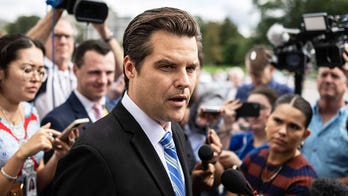Though the Obama administration is pursuing a military trial for the suspected bomber of the USS Cole, an attack that killed 17 sailors off the coast of Yemen in 2000, the president and his team have left the door open to a civilian trial for the men thought responsible for the 9/11 attacks.
Opponents of the administration's effort to try terror suspects in the civilian court system applauded the move, confirmed Thursday by Attorney General Eric Holder, to try Abd al-Nashiri at the prisoner of war camp at Guantanamo Bay, Cuba. But at a press conference Thursday, Holder was quick to say that it didn’t mean he was giving up on civilian courts for other terror suspects, like Khalid Sheikh Mohammed and other 9/11 conspirators.
“We are still in the process of determining where the trials will be and what form they will be in and no decision has been made,” Holder said of his proposal to try KSM in federal court in Manhattan, a plan which has been in legal limbo almost since the moment he first announced it 14 months ago. “Nothing is off the table yet.”
Today’s announcement of a military trial for the Cole bombing suspect seemed to mark a departure for the White House after more than a year of trying, without success, to hold civilian trials for terror suspects. But Press Secretary Robert Gibbs pushed back on the idea that this was a change in approach, saying it was consistent with the president’s speech on the subject in May 2009 at the National Archives.
“You heard the president back at the archives speech talk about the fact that we had different groups at Guantanamo that had to be dealt with in different ways,” Gibbs said.
The administration has never publicly explained a 14-month delay in the al-Nashiri case. Holder declared in November 2009 that al-Nashiri would face military justice. Holder made the announcement at the same press conference that he described his plan to try KSM, the self-professed plotter of the 9/11 attacks, in New York City, not far from the former site of the World Trade Center.
But with fierce resistance in New York to the idea and a bipartisan coalition in Congress blocking funds for the plan, the administration was eventually forced to back away from the KSM plan. There has been no word for months on the plan for KSM and his alleged co-conspirators, but the decision to go ahead with a military trial in the Cole case opened broad speculation that the administration was finally ready to move forward.
While hopeful that the president will still use federal courts for the 9/11 case, human rights groups are not happy with the Cole decision.
“U.S. partners abroad have been very critical of the use of military commissions,” said Andrea Prasow, senior counsel for Human Rights First. “In fact, some have refused to provide evidence to be used in the prosecution of detainees in a military commission while they would provide evidence in a federal court.”
The ACLU expressed disappointment in a statement and pointed to the fact that al-Nashiri is one of three detainees known to have been waterboarded – a harsh interrogation practice that simulates drowning. The group said the move by the Obama administration “raises serious questions about whether commissions are being used as a forum to hide the use of torture.
It was two years ago this week that Obama, in one of his first acts as president, signed an executive order to close the Guantanamo prison within one year.
With 173 detainees still housed there, quick closure looks unlikely. Further complicating the plan is the fact that more than half of the detainees are from Yemen, which gave rise to two recent Al Qaeda plots against the U.S. originated. Terror analysts say the country is a prime location for the terror group, leaving Obama with difficult political choices.
“It's a purely political calculation. Guantanamo is not closed. It’s not going to be closed during the first term of the Obama administration,” said Cully Stimson of the Heritage Foundation who ran detainee affairs for the Defense Department during the Bush administration. “The human rights crowds are really angry about that, but the political damage is not going to spill over into the broader Obama voting bloc unless they start referring a large number of people to commissions.”




